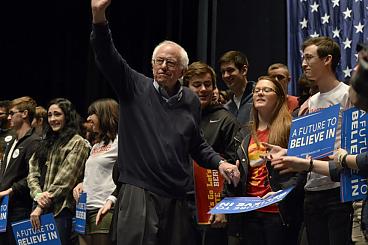In the US as in the EU, the multinationals are the real election winners
In the US as in the EU, the multinationals are the real election winners
All the fuss surrounding the American elections notwithstanding, Hillary Clinton vs. Donald Trump offers no real choice. Either will in the end be there to defend the interests of the multinationals. Had Bernie Sanders been a candidate, there would have been something to choose from. You see the same in the European Parliament: even if the centre-left Socialists and Democrats and the centre-right European People’s Party are often at each other’s throats, the two biggest political groups always in the end vote for laws that benefit only the multinationals. An example of this was provided by the Comprehensive Economic and Trade Agreement (CETA) with Canada.

The media want us to believe that the US elections are going to be extraordinarily exciting. Clinton is losing more and more of her lead over Trump and it could be not until the last minute that we know who is going to occupy the White House. Of course, all of Trump’s statements are to be deplored, apart from his rejection of trade and investment treaties such as the TTIP. With Clinton too, however, you can’t say everything in the garden is rosy. In relation to military matters she’s extremely aggressive, and her links with Wall Street are generally acknowledged. US TTIP negotiators agree that with Clinton the talks will gain a new impulse. So the Americans must choose between bad and worse. The great shame was that Clinton beat Sanders in the primaries. The latter promised even to call the economic system into question, to combat inequality and the unbridled power of the multinationals.
At European elections there tend to be more possibilities. In the Netherlands, for example, you can vote for the SP, guaranteeing that there will be a voice at least as critical of the establishment as Sanders’. Over the years, however, centre-right and centre-left have together enjoyed a solid majority in the EP. Of course, just as in the Netherlands, the social democrats come out with fine, left ideas, but when it comes to do anything about them, these ideas are quickly exchanged for opportunism. A good example is the appalling performance of the social democratic president of the European Parliament, Martin Schulz, in trying to bring the Walloon and Canadians together in order to push through the CETA, though we know that this treaty is good for no-one but the multinationals. No more left noises: with Schulz too, the multinationals come first.
Nevertheless I remain optimistic: our societies are changing. That goes for the US, where Sanders managed to mobilise a tremendous number of people, despite being given no chance before the campaign began. It goes also for the Netherlands, where the success of the campaign for a National Health Care Fund showed how much people want to break with marketisation in health services. The next EP elections aren’t until 2019, but let’s draw lessons from the past. The real choice is not between liberal, social democrats and conservatives, all of whom stand for the preservation of the power of big capital. The real choice is between this established order and modern left people who want to serve the interests of ordinary citizens in the EU. We are almost halfway through our mandate. It’s up to us to demonstrate that not only in next year’s general election in the Netherlands, but also in 2019, there will be a real choice, and that the SP, together with our European sister parties, can take a big step forward.
- See also:
- Dennis de Jong
- World
